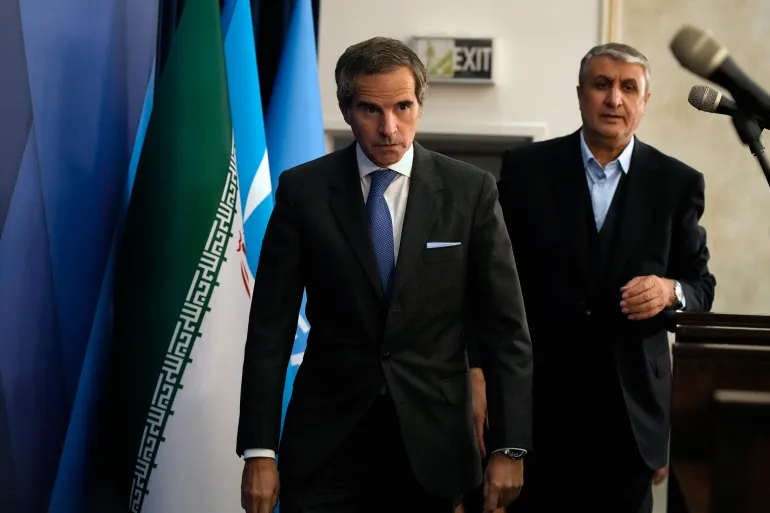Tensions Rise as Iran Prepares for Nuclear Talks with Europe
Iran announced plans to hold nuclear talks with officials from Europe which includes France, Germany, and the United Kingdom. The meeting, set for Friday, comes amid rising concerns about Iran’s nuclear programme and its uranium stockpiles . Both sides are expected to discuss key international issues, including the nuclear standoff and regional tensions.
Meeting Details Remain Under Wraps
The location of the talks has not been disclosed. It is clear that discussions will focus on the growing concerns surrounding Iran’s nuclear activities. The talks are happening at a critical time when tensions between Iran and Western nations are escalating.
The International Atomic Energy Agency (IAEA) passed a resolution criticising Iran for its lack of cooperation. This marked the third such resolution against Iran since 2020.
The resolution was supported by 19 member countries of the IAEA. Twelve countries chose to abstain, while three nations, including Russia and China, opposed the resolution. Although the move is symbolic. This move reflects mounting frustrations with Iran’s nuclear policies.
Iran Advances Its Nuclear Technology
In response to these developments, Iran revealed advancements in its nuclear technology. Officials announced the deployment of advanced centrifuges, which are used to enrich uranium. These machines will allow Iran to increase its production of enriched uranium significantly.
Despite these advancements, Iran has stated its willingness to work with the IAEA. Iran’s actions have raised concerns globally, especially with reports suggesting that Iran is nearing the threshold needed to develop a nuclear weapon.
What Is Uranium Enrichment?
Uranium enrichment is a process that refines uranium for use in nuclear power plants. However, highly enriched uranium can also be used to create nuclear weapons. The IAEA monitors countries to ensure that nuclear materials are not used for military purposes.
Iran has repeatedly claimed its nuclear programme is for peaceful purposes, but many nations remain skeptical. Recent reports indicate Iran is close to the 90% enrichment level needed to build a nuclear warhead.
Impact of Sanctions on Iran
The tensions around Iran’s nuclear activities date back several years. In 2015, Iran reached an agreement with major world powers to limit its nuclear programme. This deal, known as the Joint Comprehensive Plan of Action (JCPOA), aimed to ease global fears of Iran developing nuclear weapons.
In 2018, the United States withdrew from the agreement and imposed heavy sanctions on Iran. The move led to a breakdown in relations and increased tensions between Iran and Western countries. In response, Iran reduced its cooperation with the IAEA and resumed enriching uranium beyond the agreed limits.
Iran’s Current Nuclear Activities
Iran has been expanding its stockpile of enriched uranium and developing advanced technology to speed up the process. According to leaked reports, the country has also begun taking steps to cap its uranium stockpile, but concerns remain over its intentions.
The IAEA has repeatedly called for Iran to allow full access to its facilities and resume transparency measures. Iran has deactivated several monitoring devices installed by the UN. This has made it harder for international bodies to verify Iran’s claims about its nuclear activities.
Europe Pushes for Diplomatic Solutions
The upcoming talks between Iran and European nations are part of ongoing efforts to find a peaceful resolution. Western nations, particularly the UK, France, and Germany, are urging Iran to return to compliance with international agreements.
While diplomatic channels remain open, the road ahead is uncertain. Many countries fear that if Iran continues its current path, it could destabilise the region and spark a broader conflict.
Global Concerns Over a Nuclear Arms Race
Iran’s actions have drawn international attention, with many nations warning of the risks of a nuclear arms race in the Middle East. Neighboring countries and global powers are closely watching the situation, as any misstep could have far-reaching consequences.
The international community remains divided on how to handle the situation. While some countries advocate for tougher sanctions, others call for continued dialogue to prevent escalation.
The meeting on Friday could play a critical role in shaping the future of Iran’s nuclear programme. Both sides are under pressure to reach an understanding that addresses international concerns while respecting Iran’s sovereignty. For now, the world waits to see if diplomacy can succeed in easing tensions and preventing a nuclear crisis.

